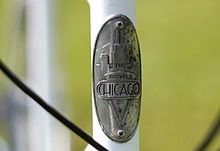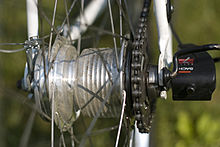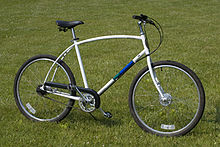- Chicago Bicycle Company
-
The Chicago Bicycle Company was an American bicycle company which operated from 1994 to 1997.
Contents
History
Founded and owned by Vermont Teddy Bear Company owner John Sortino, the company had its headquarters in Burlington, Vermont with production taking place in Chicago, Illinois. Based on tradition, the bicycle utilized an internal-gear hub, available in both 3,5 and 7-speed options.
Sortino hired a Burlington Vermont bike techinican, Mark P. Walker, assisted by Tim Matthewson of Champion Cycles, to provide a marketable bicycle concept that would appeal to commuters and people wishing to have a practical alternative to the mountain bike and road bike without the complication of derailleurs, and above all, made in the U.S. The bicycles sold for $500– $1000, depending on hubs, and options chosen by the customer. 50 framesets were originally fabricated by Tri-Angle Metal Fab in Milton, Vermont, and 50 more were made by Waterford Precision cycles of Waterford, Wisconsin, under the guise of Richard Schwinn (great grandson of Ignaz Schwinn) and Mark Muller. After that, the CBC built their own in a factory on 363 W. Erie in Chicago, Illinois. The Design of the bicycles was carried out cooperatively between the Team in Vermont and the Team in Chicago. Industrial Designers Mr. Patrick Ege, and Mr. Joe Ryan both based in Chicago at the time worked to develop the frame geometries in CAD, welding jig setups, and completed most of final prototyping and testing. Mr. Ryan also served as the shop foreman and oversaw fabrication at the facility in Chicago including milling operations, welding, and powder coating. Master Bicycle Technician Mr. Vincent Delfini oversaw the buildup of the frames from custom components selected by customers. Approximately 100 or more were made before the company went out of business in 1997.
The framesets were made from True Temper 4130 CrMo Steel with Reynolds 531 chainstays, and CBC’s own CrMo fork. The frames were powdercoated to any color to order, or to any of the several predetermined models. CBC offered Sachs 3,5, and 7 speed hubs, with Sun M25 rims. A selection of handlebars, saddles, mudguards, racks, were added per customer’s specs. The headbadge was made in Middlebury, Vermont by Danforth Pewterers, by lost-wax casting method. These badges cost $10 each to produce, and were hand fitted to every frame. The factory in Chicago had a second floor loft style sales room where fabrication took place in front of customers and had a test track that customers could try the bikes out indoors.
Models include the Shoreline Cruiser, Silver Shadow, and the Wonder Bike.
The bicycle shown in three of the photos was one of 5, 22” frames made for the Burlington Police Department, with the Sachs 7-speed alloy front and rear hubs with dual drum brakes. Only one of these bicycles was known to have made it to the BPD for testing, the rest were lost, or unaccounted for after the company went out of business. The additional Purple bicycle is a three-speed in its original Commuter Cruiser guise with White Wall tires and sprung seat.
The Chicago bicycle was unfortunately ahead of its time,as many people were unwilling to spend more than $200 for what was perceived as a beach cruiser. The Chicago bicycle was much more than that, intended to become a tool to be used to get someone to work, or go for a nice ride on weekends on a trouble-free bicycle.
Sortino left Chicago Bicycle in January 1998, and Chief Operating Officer Stephen Marmon took over as chairman and CEO at the request of the investors. At that point, the company was suffering substantial losses. "I shut down all production within days of becoming CEO," says Marmon.[1]
Although he still felt that an expensive cruiser could be a viable business proposition, Marmon says the built-to-order model didn't work. "The cost of production was too high," he notes. That, coupled with the low number of bikes the company produced, made profitability virtually impossible. CBC was renamed the US Bicycle Corp and Marmon says he's working with investors to turn the company into a roll-up[2].
Today
Today, Joe Breeze is making a very similar bicycle that achieves all the Chicago bicycle was hoping to be, for about the same price tag.
John Sortino is also the owner of worldwidemonkey.com.
Mark Walker now works for Mobility Without Barriers worldmobility.org, designing all-terrain cycles for polio and land-mine victims in Ethiopia and India.
Patrick Ege and Joe Ryan are professional Industrial Designers and bicycle aficionado's. Vincent Delfini is an expert in quality control.
References
- ^ Anatomy of a Start Up at http://www.inc.com/articles/2000/11/21394.html
- ^ Anatomy of a Start Up at http://www.inc.com/articles/2000/11/21394.html
External links
Categories:- Cycle manufacturers
- History of Chicago, Illinois
- Burlington, Vermont
Wikimedia Foundation. 2010.



